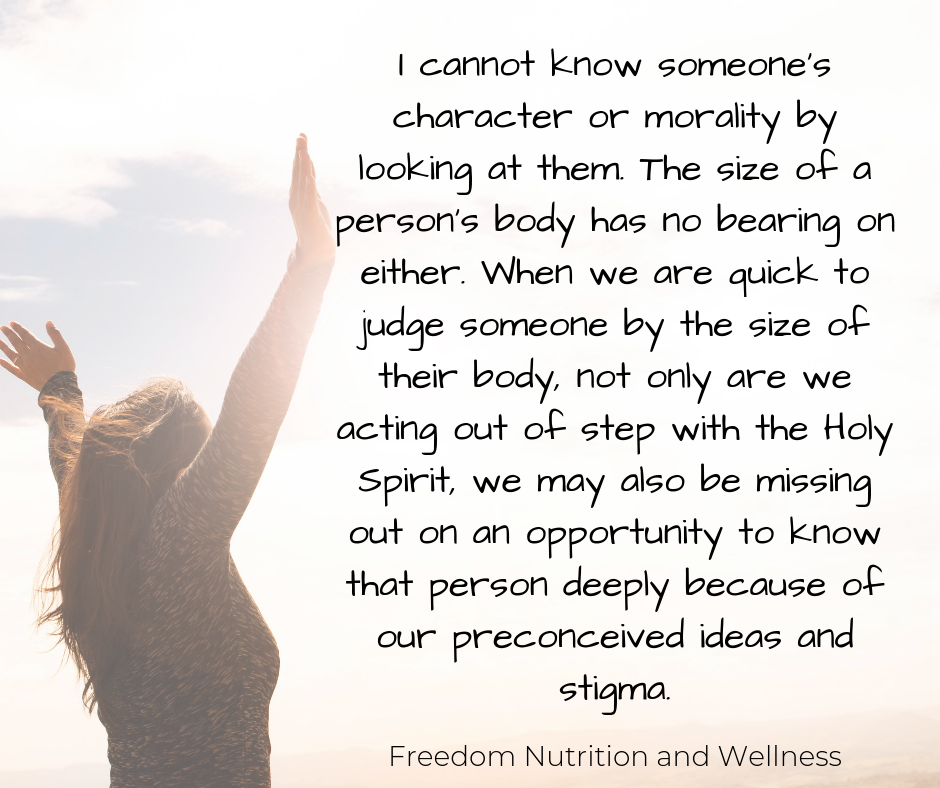How the Bible informs our view of fatness
A foundational part of making peace with food is letting go of controlling our body size. With this comes the uncertainty of what will happen to it and the potential of weight gain. And to be honest, the potential of weight gain that isn’t acceptable to our thin-obsessed culture. This is something that almost all of my clients struggle with: “but what if I become fat”?? I think we need to address what is at the root of our fear of fatness. Is it fear of losing some part of our pseudo identity (I say pseudo because your identity is not truly found in your body)? Is it fear of being ostracized by friends or family? Is it rooted in our own negative assumptions about people in fat bodies?
If I’m being transparent, I used to have a lot of negative assumptions about fat people (I say “fat people” because it is simply a description, not a negative judgment). When I learned about intuitive eating, I had to work through those assumptions and decide whether or not they were true and whether or not they were in-line with Scripture. There was no way I was going to be able to accept my body getting bigger if I made judgments about other people’s big bodies. As I started to explore my view of fatness and fat people, I realized that I had a lot of untrue beliefs about the behaviors of fat people as well as my own bias about it.
First, let’s address that our body weight is LARGELY out of our control and is determined by a host of factors, namely genetics. Socioeconomic status, education level, and stigma also play a huge role. When we recognize that our weight isn’t always a direct result of our behaviors, we no longer have space to blame the individual for the size of their body—it’s not because they are lazy, undisciplined, or gluttonous. And yet, these are stigmas that are very much attributed to people in large bodies. I assure you that there are people in large bodies who eat very little and move a lot, and that there are people in thin bodies who eat a lot and move very little. We canNOT know a person’s behaviors around food simply by looking at them.
Not only is it assumptions about their health or their food habits that we have to address, it’s also beliefs about their character. Again, I cannot know someone’s character or morality by looking at them. The size of a person’s body has no bearing on either. When we are quick to judge someone by the size of their body, not only are we acting out of step with the Holy Spirit, we may also be missing out on an opportunity to know that person deeply because of our preconceived ideas and stigma. 1 Samuel 16:7 teaches about the character of God and how He does not look at outward appearance as we do, but instead He looks at and judges the heart (which make me realize I need to be less concerned with others hearts and more concerned about my own). Furthermore, multiple times throughout Scripture, it says that God shows no partiality (Romans 2:11, 10:12, Acts 10:34, Galatians 3:28 just to name a few). In fact, all throughout the Gospels we see Jesus pursuing and loving the poor, sick, marginalized, and outcast.
Let me briefly address the identity issue: I completely understand finding identity in what your body looks like or how you exercise or what food you put in your mouth—I’ve been there. But trying to find my identity in how my body looked was anxiety-provoking, ever-changing, and ultimately, fruitless. Who I am and Whose I am are firmly rooted in the person and work of Jesus. Trying to find my identity in body doesn’t work because that’s not where its found. So if my body changes (which it WILL throughout life), my identity is not affected.
Now, I completely affirm people’s fear of becoming a size that is not acceptable. People in larger bodies are ostracized, judged, and treated poorly. For those accepting their natural size beyond cultural standards, there is the potential for experiencing real discrimination and emotional trauma. That’s not a position any of us want to willingly put ourselves in. But instead of constantly fighting body size, we need to be fighting culture. I hope to live in a society where all bodies are seen as good and that everyone has the space to pursue whole health (physical, emotional, spiritual, relational). For those of you in large bodies, I’m sorry. I’m sorry for the messages you’ve received about your body. And for the way you’ve been treated differently. You are seen, loved, and cherished by your heavenly Father.
This is a difficult topic and I’m sure there are some who have lots of questions or issues with what I’ve brought up (the church at large teaches a thin=healthy=holy message). I’d love to hear what you’re struggling with when it comes to fatness and the Christian faith. I’d love to be able to address them in further posts, so comment below!


